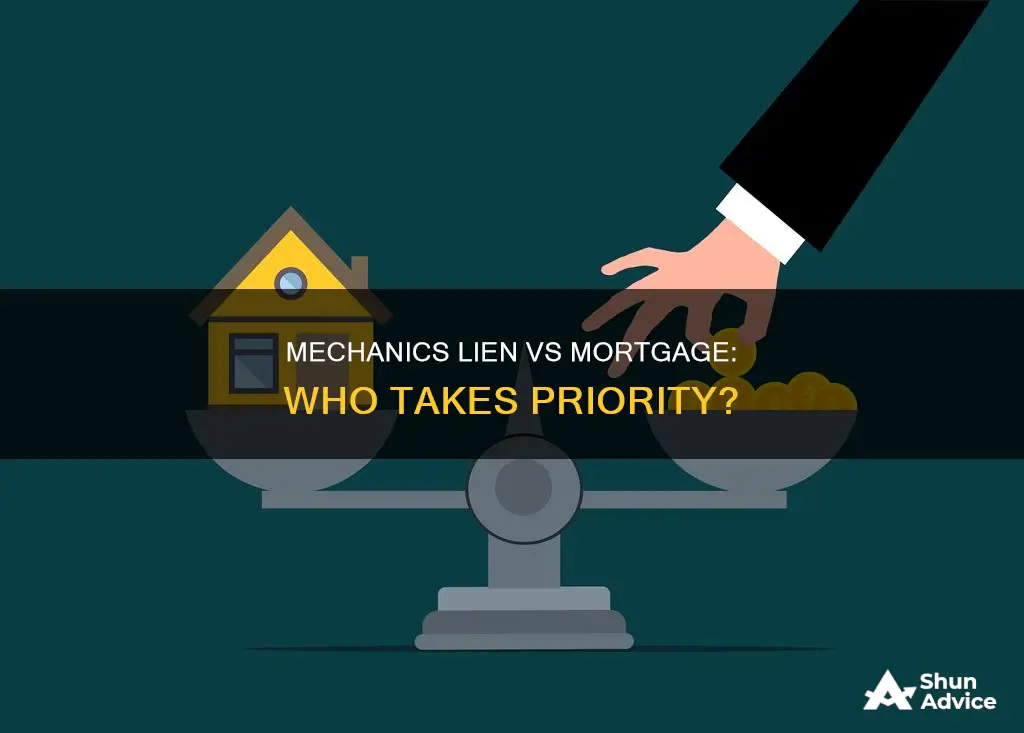
Mechanics' liens are a powerful tool for contractors, subcontractors, and suppliers to protect themselves against non-payment for work or materials supplied to construction projects. They can, in some cases, take priority over a mortgage, but this is dependent on the state and the specific circumstances. The general rule, known as the first in time, first in right rule, states that the first encumbrance on a property to be filed is the first to be paid off, but there are exceptions to this rule. For example, in some states, a mechanics' lien may relate back to the first day of work on a project rather than the date it was filed, and in rare cases, mechanics' liens have been given blanket priority over all pre-existing liens.
| Characteristics | Values |
|---|---|
| What is a mechanics lien? | A tool to protect against non-payment. |
| Who can file a mechanics lien? | Contractors, subcontractors, and material suppliers. |
| When can they file it? | When the property has been improved by the goods, labor, or services supplied but payment has not been made. |
| Where is the lien recorded? | In public property records, in the county recorder's office. |
| Does a mechanics lien always take priority over a mortgage? | No, it depends on the state and the timing of the filing. |
| What is the general rule for lien priority? | The "first in time, first in right" rule, meaning the first to file gets priority. |
| Are there exceptions to this rule? | Yes, in some states, the mechanics lien filing date relates back to the first day of work on the project, not the date of filing. |
| Can a mechanics lien have priority over a mortgage filed first? | Yes, in some states, a mechanics lien can take priority over a previously recorded mortgage. |
| What is a "super lien"? | A category of lien that is given higher priority than other types of liens, including first mortgages. |
| What is the impact of lien priority? | It determines the order in which creditors get paid following a foreclosure. |
What You'll Learn

Mechanics lien laws
Mechanics' lien laws are statutes that exist in every US state to protect contractors, subcontractors, and material suppliers who furnish labour or materials to construction projects. These laws allow contractors, subcontractors, and suppliers to impose a lien on an owner's property if the property has been improved by the goods, labour, or services supplied but payment has not been made. The lien is recorded in public property records and appears on a title search of the property. In some instances, it can take priority over a lender's recorded mortgage.
The priority of liens establishes who gets paid first following a foreclosure and often determines whether or not a lienholder will get paid at all. A first lien has a higher priority than other liens and gets paid first out of foreclosure sale proceeds. If any sale proceeds are left after the first lien is paid in full, the excess proceeds go to the second lien, and so on. The most prominent way states sort out lien priority is through the "first to file" or "first in time, first in right" rule, which means that whichever encumbrance on a property was filed first gets paid first among creditors. However, this rule tends to favour mortgage holders.
There are some instances where mechanics' liens take priority over mortgages. In some states, the mechanics' lien filing date relates back to the first day of work on the project rather than when the lien was filed. In others, mechanics' liens can be put before mortgagers even when the mortgage was filed first. For example, in North Carolina, a mechanics' lien takes priority over a mortgage if labour or materials are supplied or if construction begins before the recording of a mortgage. In Oregon, mechanics' liens have priority over all pre-existing liens for labour or materials supplied on new residential construction.
In Iowa, subcontractors must post a preliminary notice to the Mechanics Lien and Notice Registry before the balance due is paid by the owner to the general contractor. If the subcontractor does not receive payment, they can enforce a mechanics lien on the improved property even if they have no direct contractual relationship with the property owner.
Mortgages and Death: Judgment Mortgage's Survival Explained
You may want to see also

First in time, first in right rule
The "first in time, first in right" rule is a general rule in property law that determines the priority of liens. It states that the lien that is recorded first in the land records has a higher priority over later-recorded liens. This rule is also known as the "first to file" rule, which essentially means "first come, first served".
In the context of mortgages and mechanics liens, the "first in time, first in right" rule can be applied to determine which has priority. Typically, a mortgage is recorded first, giving it senior priority over a mechanics lien. However, there are instances where a mechanics lien can take priority over a mortgage, depending on state-specific laws. For example, in some states, the mechanics lien filing date relates back to the first day work was done on the project rather than when the lien was actually filed. In other states, a mechanics lien can take priority over a mortgage even when the mortgage was filed first.
The priority of liens is crucial, especially in cases of foreclosure, as it determines the order in which creditors get paid. If a property is foreclosed on, the lien priority will determine if and when a lienholder will get paid. The holder of the lien with the highest priority will be paid first from the proceeds of the foreclosure sale.
It is important to note that there are exceptions to the "first in time, first in right" rule. Certain liens, such as tax liens, HOA and COA liens, and mechanic's liens, can sometimes have priority over previously recorded liens, depending on state law. Additionally, there may be subordination agreements or other contracts that can affect the order of priority among creditors.
Ladybird Deed: Mortgage Default Protection for Homeowners
You may want to see also

Super-priority
In property law, the general rule is that liens are prioritized based on the order in which they are filed in the county records office. This is known as the "first in time, first in right" rule. Typically, a recorded interest takes precedence over later-recorded interests.
However, there are exceptions to this rule. In some states, a mechanics lien's filing date relates back to the first day of work on the project rather than when the lien was filed. This means that even if the mortgage was recorded first, the mechanics lien may still have priority. This is known as "super-priority."
Notably, in North Carolina, a mechanic’s lien dates back to the first day that the contractor or subcontractor brings materials or equipment to the property or begins work on the project. So, if labor or materials are supplied, or construction begins before the recording of a mortgage, and a mechanic’s lien is subsequently filed, the mechanic's lien will take precedence over the mortgage.
Similarly, in Oregon, liens for labor or materials supplied on new residential construction have super-priority, meaning they take precedence over all pre-existing liens, regardless of when those liens were filed.
In summary, while the general rule for lien priority is "first in time, first in right," there are exceptions where mechanics liens can be granted super-priority over even first-mortgage holders. This super-priority status can significantly impact the order in which creditors are paid following a foreclosure.
How to Treat Your Mortgage: Asset or Liability?
You may want to see also

State-specific laws
The general rule in property law is that liens have priority in the order that they are filed in the county records office. This is known as the "first in time, first in right" rule. However, this rule has some exceptions, and the priority of a mechanics lien over a mortgage lien will depend on state-specific laws.
In New York, for example, the "first in time, first in right" rule is strictly enforced. If a mortgage is recorded before the recording of a mechanics lien, the mortgage will retain priority status. However, New York also has the "Relation Back" Rule and the "Lien Parity" Rule, which can complicate the priority structure. The "Relation Back" Rule states that a mechanics lien can relate back to the date the contractor first began work on the project, rather than the date of filing. On the other hand, the "Lien Parity" Rule states that when multiple mechanics liens are filed, they share priority status, regardless of the date each notice of lien was filed.
In North Carolina, the date used to determine priority status on a mechanics lien is based on when the work began or when the goods were delivered, rather than the date of filing. Therefore, if materials are delivered or construction has begun before the lender records their mortgage, any filed mechanics lien will have senior priority, even if recorded after the mortgage.
Oregon is one of the few states that prioritize mechanics liens over all pre-existing liens, regardless of when the liens were filed. In this case, liens for labour or materials supplied on new residential construction have priority.
In Pennsylvania, the safe harbour law subordinates after-filed mechanics lien claims to the lien of open-end mortgages if the loan proceeds are used for construction or repair of the mortgaged premises.
Lenders should be aware of state-specific statutes regarding mechanics liens and understand how their interests can be protected. Lenders should also closely monitor construction projects and obtain mechanics lien waivers whenever possible.
Divorce Decree and Mortgage: Who Takes Priority?
You may want to see also

Bankruptcy
The general rule in property law is that liens have priority in the order that they are filed in the county records office. This is known as the "'first in time, first in right' rule." In most states, mechanics' liens "'relate back'" to the time when work begins, meaning the time of recording is counted as the first day of work on the project.
However, the "first in time, first in right" rule is not always followed. In some states, the mechanics' lien filing date relates back to the first day of work, while in others, lien holders can be put before mortgagers even if the mortgage was filed first. This is especially true for "'super-liens',", which are given higher priority than other types of liens, including first-mortgage holders. In the case of bankruptcy, a mechanics' lien will remain enforceable, but the debt giving rise to the lien may be discharged. This is because a mechanics' lien is a right against property, not the owner, so while the debtor's personal obligation to pay may be extinguished, the obligation on the property is not.
In a bankruptcy petition, the filer lists their creditors, and the court sends a proof of claim form to each one. This form must be signed and supported by documents such as unpaid invoices, contracts, and other proof of the claim. In Chapter 11 bankruptcy, these forms contain "bar dates", which are deadlines for filing with the bankruptcy court to preserve the right to assert a claim against the party filing for bankruptcy.
Chapter 7 bankruptcy is the most common type, and it involves liquidating the debtor's non-exempt assets and distributing the proceeds among creditors based on established priorities. Chapter 11, on the other hand, is a reorganization proceeding, where creditors can remain in possession of their assets and continue to operate their business under court or committee oversight.
To summarise, while mechanics' liens do not always take priority over mortgages, they are a secured claim that survives bankruptcy. However, the complex nature of bankruptcy and lien priority means that it is recommended to seek the help of an experienced bankruptcy attorney to ensure full payment.
Florida Mortgage Witness Requirement: What You Need to Know
You may want to see also
Frequently asked questions
No, it depends on the state. In most states, the general rule is that liens have priority based on the order they are filed, which is known as the "first in time, first in right" rule. However, some states, like Oregon, have laws that give mechanics liens priority over mortgages in certain circumstances.
The "first in time, first in right" rule, also known as the "first to file" rule, means that the first document filed will have priority. So, if a mortgage is recorded before a mechanics lien, the mortgage will have priority.
Lenders should recognize and understand the specific laws regarding mechanics liens in their state. In some states, like New York, a lender's mortgage can gain priority over a mechanics lien if the lender complies with certain statutory requirements.
If a mechanics lien has priority, the mechanic's lienholder will be paid first following a foreclosure. If there is any money left over, then the mortgage lender will be paid.







